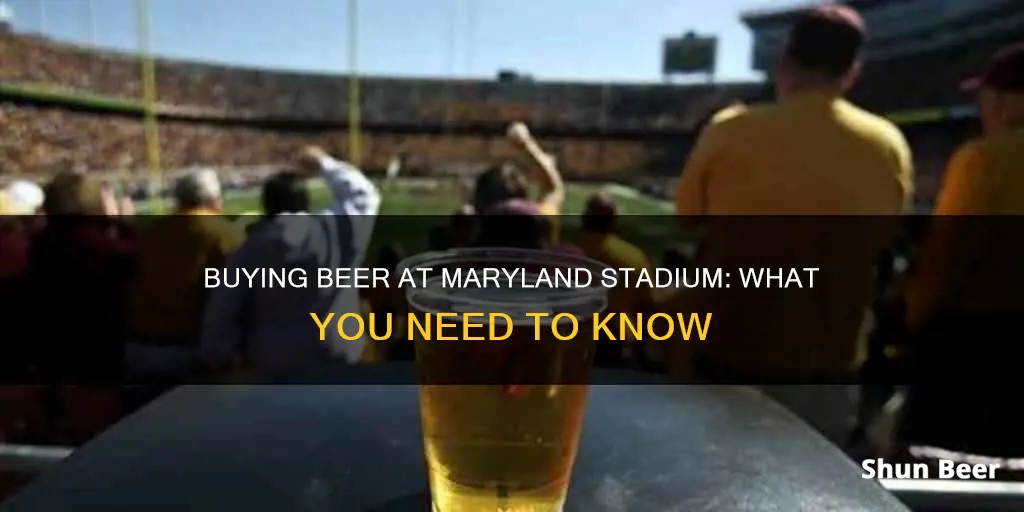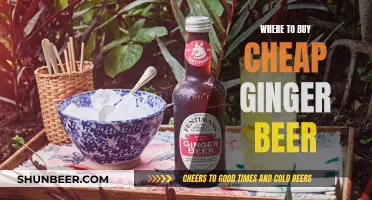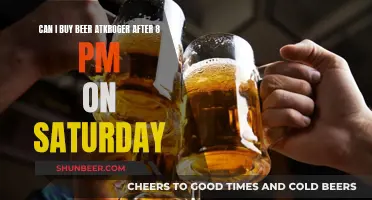
Beer and wine have been available for purchase at the University of Maryland's stadium, Capitol One Field, since 2015. The stadium policy requires anyone appearing to be under the age of 40 to present a valid government-issued photo ID for service and imposes a limit of one beer per person per transaction. Beer sales stop at the end of the third quarter, and anyone misrepresenting their age to obtain beer will be immediately ejected from the stadium and criminally prosecuted. The University of Maryland's proposal to sell alcohol during athletic events was initially met with some opposition, but it was ultimately approved for a one-year trial period.
| Characteristics | Values |
|---|---|
| Stadium Name | Capitol One Field at Maryland Stadium |
| Alcohol Availability | Beer is available for purchase at stands and kiosks throughout the stadium |
| Age Limit | Anyone appearing to be under the age of 40 will be required to present a valid government-issued photo ID for service |
| Purchase Limit | There is a limit of one beer per person per transaction |
| Sales Timing | Beer sales stop at the end of the third quarter even if fans are still in line |
| Misrepresentation of Age | Anyone misrepresenting their age to obtain beer will be immediately ejected from the stadium and criminally prosecuted |
| Providing Alcohol to Minors | Anyone providing beer to anyone under 21 years of age will be immediately ejected from the stadium and criminally prosecuted |
| Intoxication | Any fan who appears to be intoxicated will be ejected from the stadium |
| Refusal of Service | The University reserves the right to refuse alcoholic beverage service to anyone at its sole discretion |
What You'll Learn

The University of Maryland's proposal to sell beer and wine
The University of Maryland has proposed selling beer and wine at football and baseball games. The proposal, which was submitted in 2015, suggests that alcohol be sold at the University's two main campus venues, Byrd Stadium (now Capitol One Field at Maryland Stadium) and Xfinity Center. The Prince George’s County Board of License Commissioners, who hold the final approval authority, addressed the proposal during a public hearing on July 8, 2015.
Maryland President Wallace D. Loh detailed the incentives for the move in a letter distributed to the campus community, writing that it “will enhance the fan experience” and help reduce binge drinking. Loh cited evidence from Syracuse and Colorado State, which offer alcohol at athletic events and have reported no increase in binge drinking behaviour. In addition, the sale of alcohol would provide the school with a new revenue stream, with Loh estimating the school will make approximately $500,000 per year, which he has vowed to donate to student services such as mental health counselling, responsible drinking programs, and sexual-assault awareness programs.
The vetting and review of the proposal drew more than 1,000 responses in an online university forum, with most students in favour of the proposal and most faculty and staff against it. If approved, the plan would be implemented as a one-year trial, with alcohol sales ending well before the end of the game and anyone appearing to be under the age of 40 required to present a valid government-issued photo ID for service. There would also be a one-drink limit per transaction, and the University reserves the right to refuse alcoholic beverage service to anyone at its sole discretion.
Should the plan be approved, Maryland would join a growing trend of colleges allowing alcohol sales at athletic events. In 2019, 88% of FBS schools sold alcohol, with 56 schools starting to do so since the 2019 football season.
Where to Buy Medalla Beer?
You may want to see also

The Prince George’s County Board of License Commissioners' authority
In 2015, the University of Maryland proposed selling beer and wine during athletic events at its two main campus venues, Byrd Stadium and Xfinity Center. The proposal was to be addressed by the Prince George's County Board of License Commissioners, which holds the final approval authority, during a public hearing on July 8, 2015.
The Prince George's County Board of License Commissioners is responsible for enforcing the alcohol beverage laws of the State of Maryland. Their mission is to promote the education of licensees and the public, while encouraging socially responsible consumption of alcoholic beverages. They accomplish this through comprehensive inspections and strict licensing, ensuring compliance with all alcohol beverage regulations and state laws.
The Board of License Commissioners provides the highest level of service to the citizens of Prince George's County through education and partnership with county agencies. They also offer temporary one-day licenses and entertainment permits.
The Board consists of a Chair, Vice-Chair, and three Commissioners. They hold regular hearings, which are open to the public, and their agendas and minutes are available on their website. In the event of inclement weather, the Board will provide notice on their webpage and answering machine, and evening hearings will be canceled by 3:00 p.m. if bad weather is expected.
Buying Beer on Sundays in Easley, SC: What's Allowed?
You may want to see also

Alcohol sales at games will reduce binge drinking
In 2015, the University of Maryland proposed selling beer and wine at football and baseball games. The university's president, Wallace D. Loh, argued that alcohol sales at games would enhance the fan experience and reduce binge drinking. This proposal was supported by the Student Government Association, Graduate Student Government, University of Maryland Police Department, and the Athletic Council.
Loh cited evidence from Syracuse and Colorado State, which have reported no increase in binge drinking behavior at games where alcohol is sold. In addition, West Virginia, which started selling beer inside its stadium in 2011, has reported a 30% decrease in alcohol-related offenses.
The National Institute on Alcohol Abuse and Alcoholism (NIAAA) has identified binge drinking as a significant problem on college campuses, linked to 1,825 student deaths and 97,000 sexual assaults annually. While some argue that selling alcohol at college games will only exacerbate this problem, others contend that it will help to reduce binge drinking by providing a controlled environment for drinking.
Those in favor of alcohol sales at games argue that it will create a more social drinking environment, rather than a binge-drinking culture. For example, Patrick Ronk, Maryland's student body president, stated that students will be able to "have a beer or two to keep [their] buzz going" instead of "rip [ing] 12 shots before [they] go into the game." In addition, schools can implement policies to mitigate the risks associated with alcohol sales, such as only selling beer, limiting purchases to two drinks at a time, and stopping sales midway through the game.
Furthermore, allowing alcohol sales at college games can provide additional revenue for schools, which can be used to fund student services such as mental health counseling, responsible drinking programs, and sexual-assault awareness programs.
Best Places to Buy a Keg of Beer
You may want to see also

The vetting and review of the proposal
The University of Maryland's proposal to sell beer and wine at football and baseball games was met with a mixed response. The vetting and review process was extensive, with over 1,000 responses in an online university forum. The proposal was generally well-received by students, with most in favour of the plan. However, it is important to note that the faculty and staff were less supportive of the initiative.
The University's President, Wallace D. Loh, outlined the potential benefits of the proposal in a letter to the campus community. Loh emphasised that the sale of alcohol at games would enhance the fan experience and reduce binge drinking. He cited examples from Syracuse and Colorado State, where the introduction of alcohol sales at athletic events had not led to an increase in binge drinking behaviour. This was a significant consideration, given that Maryland Stadium has a capacity of 54,000, with an estimated 85% of fans being over the age of 21.
The proposal also included several stipulations to address concerns about alcohol consumption. For example, no alcohol would be sold near the student sections, and there would be a one-drink limit per transaction. Additionally, all fans under the age of 40 would be required to show valid identification, and alcohol sales would end before the conclusion of the game.
The vetting and review process also considered the potential impact on the university's revenue and student services. It was estimated that the university could generate approximately $500,000 per year from alcohol sales, with the proceeds being directed towards student services such as mental health counselling, responsible drinking programs, and sexual-assault awareness initiatives.
The proposal underwent a thorough evaluation by the university's Student Government Association, Graduate Student Government, University of Maryland Police Department, and the Athletic Council, who ultimately voted 16-1 in favour of the plan. The final decision rested with the Prince George’s County Board of License Commissioners, who approved a one-year trial of the proposal, allowing the university to sell beer and wine at concession stands during athletic events.
Buying Beer Late at Night: What's the Legal Limit?
You may want to see also

Maryland Stadium's alcohol policy
In 2015, the University of Maryland proposed selling beer and wine at football and baseball games at its two main campus venues, Byrd Stadium and Xfinity Center. The Prince George’s County Board of License Commissioners, which holds the final approval authority, was set to address the proposal during a public hearing on July 8, 2015. If approved, the University of Maryland would have sold beer and wine at concession stands for a one-year trial period beginning in the fall of 2015.
Maryland President Wallace D. Loh detailed the incentives for the move in a letter distributed to the campus community, writing that it “will enhance the fan experience.” Loh also asserted that alcohol sales at games will help reduce binge drinking, citing evidence from Syracuse and Colorado State, which have reported no increase in binge drinking behavior at games where alcohol is served.
At the time of the proposal, only 32 of 128 Football Bowl Subdivision programs allowed beer sales, with just five of those schools—Louisville, Miami, Minnesota, Syracuse, and West Virginia—playing in one of the "power five" conferences that earn higher revenue from television contracts.
The University of Maryland's proposal to sell alcohol at football and baseball games highlights a growing trend of colleges and universities loosening restrictions on alcohol sales during athletic events. This trend has been driven by a desire to enhance the fan experience, promote responsible drinking, and generate additional revenue for the school.
As of 2023, 88% of FBS schools, or 117 out of 133, sell alcohol during college football games. This marks a significant increase from previous years and indicates a continuing trend of colleges and universities relaxing their alcohol policies during athletic events.
Snake Venom Beer: Where to Buy This Exotic Brew?
You may want to see also
Frequently asked questions
Yes, beer is available for purchase at stands and kiosks throughout the Maryland Stadium.
Yes, anyone appearing to be under the age of 40 will be required to present a valid government-issued photo ID for service.
Yes, there is a limit of one beer per person per transaction.
Beer sales stop at the end of the third quarter even if fans are still in line.
Yes, anyone misrepresenting their age to obtain beer or providing beer to anyone under 21 years of age will be immediately ejected from the stadium and criminally prosecuted.







